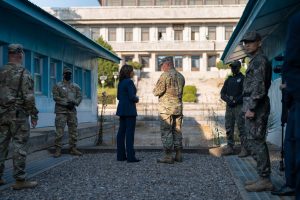Following U.S. President Joe Biden’s decision to step aside from the presidential election due to deep-rooted concerns over his capability to work as president for four more years, Vice President Kamala Harris is a lock to assume the Democratic nomination at next week’s national convention.
As Harris selected Minnesota Governor Tim Walz as her running mate, both Democratic Party and Republican Party have finalized their line-ups for the November presidential elections: Harris and Walz versus former President Donald Trump and U.S. Senator J. D. Vance.
Considering then-President Trump’s moves on North Korea in 2018 and 2019, it is likely that he would try a top-down approach again to directly negotiate with the North Korean leader, Kim Jong Un. We might see an updated version of his strategy on North Korea centered on arms control or nuclear program freeze, as his “all or nothing” strategy did not work out in Hanoi in 2019 and he may already see the denuclearization of North Korea as a mission impossible.
However, as North Korea has strived to strengthen ties with Moscow while boosting its missile capabilities with Russia’s enhanced back-up, it is questionable whether Pyongyang would again show up at the negotiating table.
If Trump wins the election, many scenarios can be drafted due to his unsettled diplomatic skills. However, for Kamala Harris, who is the first female vice president and has a chance to be the first female president in U.S. history, there is a limited range of possible outcomes for her diplomacy with North Korea.
In September 2022, Harris went to the Demilitarized Zone on the Korean Peninsula when she visited South Korea. After the tour of the DMZ, she denounced the Kim regime. “In the North, we see a brutal dictatorship, rampant human rights violations, and an unlawful weapons program that threatens peace and stability,” Harris said at the time.
Harris’ views on North Korea appear to be line with Biden’s practical approach, which in turn is no different from the Barack Obama administration’s “strategic patience.”
Like other Biden administration officials, Harris has called “the complete nuclearization of the Korean Peninsula” a shared goal of the U.S. and South Korea. As president, we could expect her approach to North Korea will thus be centered on dismantlement of nuclear arsenal in North Korea.
But Kim has consolidated his power with growing nuclear missile capabilities and has vowed to not give up his nuclear weapons under any conditions. If Harris beats Trump in November, her administration may spend four years with no results on the Korean Peninsula issues just as the Biden administration has done.
Former President Obama also failed to deter North Korea’s ambition to beef up its nuclear missile capabilities. This led him to warn his successor of growing threats in their lone meeting after Trump won the 2016 election.
The Biden administration implied its policy on North Korea is different from the Obama administration’s, even spending months on a policy review on North Korea after Biden took office in January 2021. But the results have largely looked the same. The Biden administration’s offer to hold talks “anywhere, anytime, with no preconditions” has not enticed Pyongyang return to the negotiating table. After the breakdown of the Kim-Trump summit in Hanoi, North Korea now has its own preconditions for dialogues with the United States, in the form of preemptive concessions from Washington.
As Harris would mainly focus on the prolonged war in Ukraine, the Israel-Hamas war, and heightened competition with China, North Korea will likely be off Washington’s priority list yet again – which will give Pyongyang another four years to develop more advanced nuclear weapons.
Soon or later, Washington will come to regret its consistent inactive response to Pyongyang’s steadfast missile developments. That moment may come in 2026, when Kim’s “five-year military development plan” – unveiled in January 2021 at the 8th Congress of the Workers’ Party of Korea – is successfully carried out.
In this context, it is crucial for Washington to work with Beijing and Moscow to tackle the years-long nuclear threats posed by Pyongyang, despite the United States’ aggravated relations with these North Korean neighbors.
































